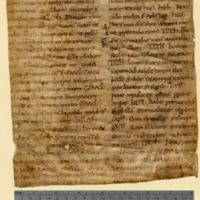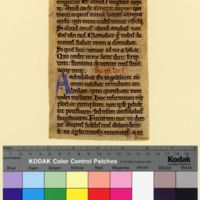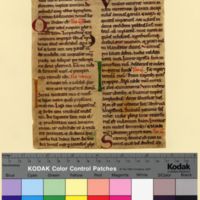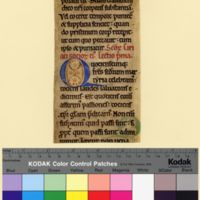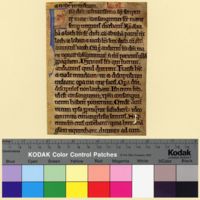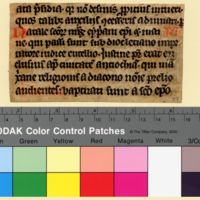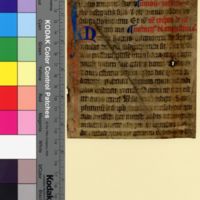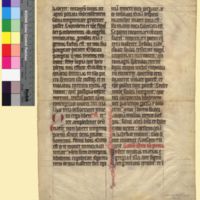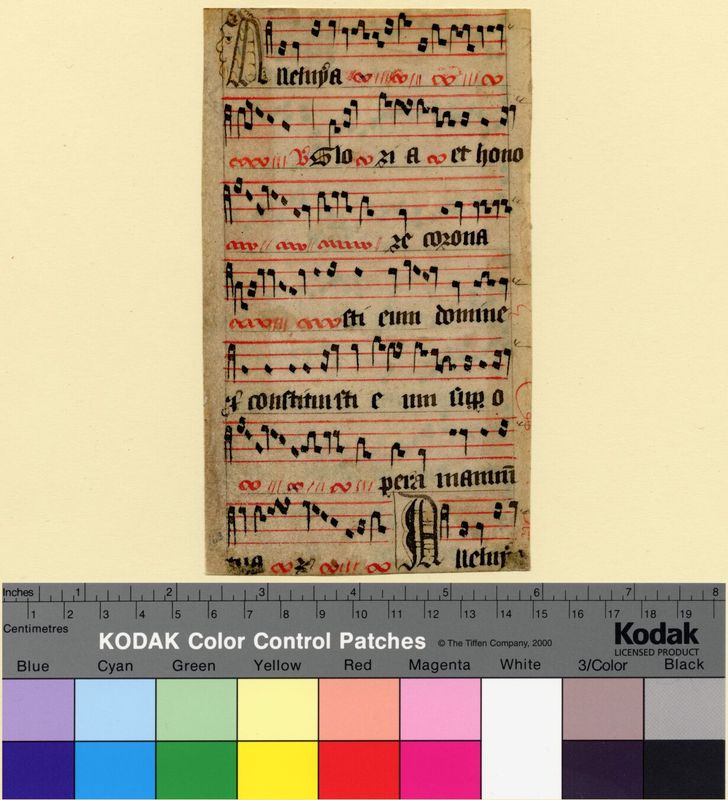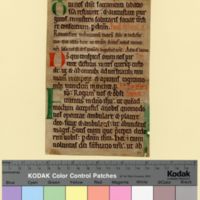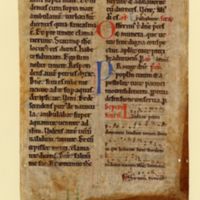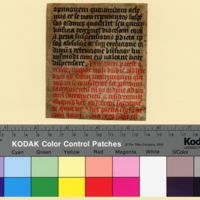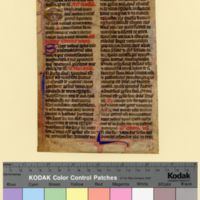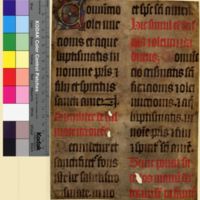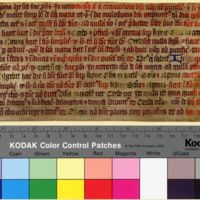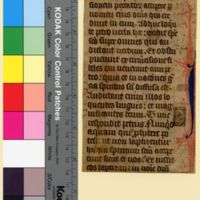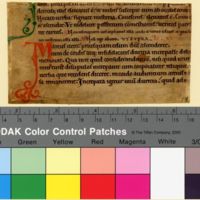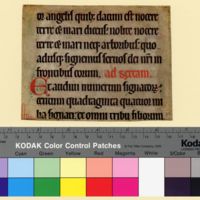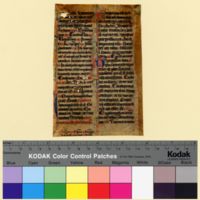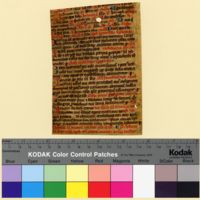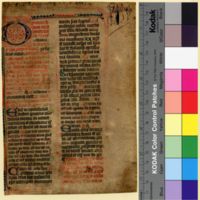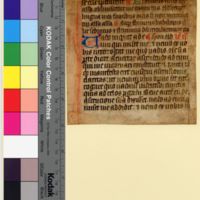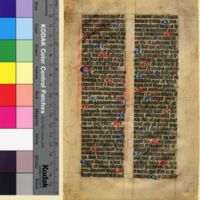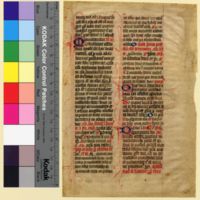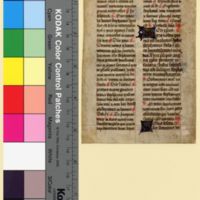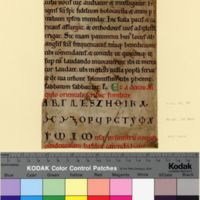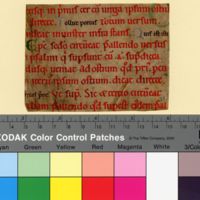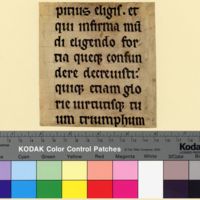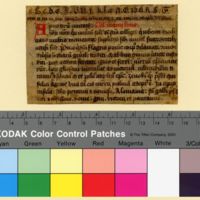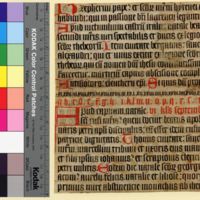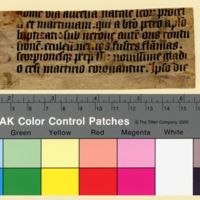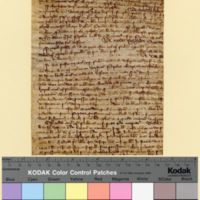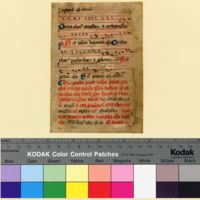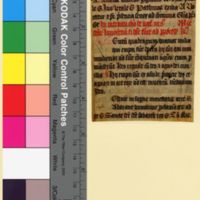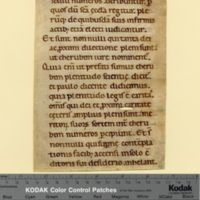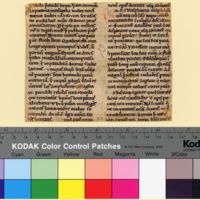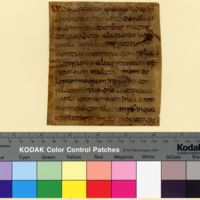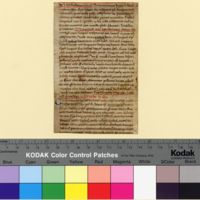Fragmenta Manuscripta
Liturgical Texts
The liturgy is the official services provided by the Church including ceremonies, prayers, and sacraments. Liturgical books are official books that contain texts that can be used in the official services. The Fragmenta Manuscripta has fragments representative of a range of liturgical texts discussed in more detail below.
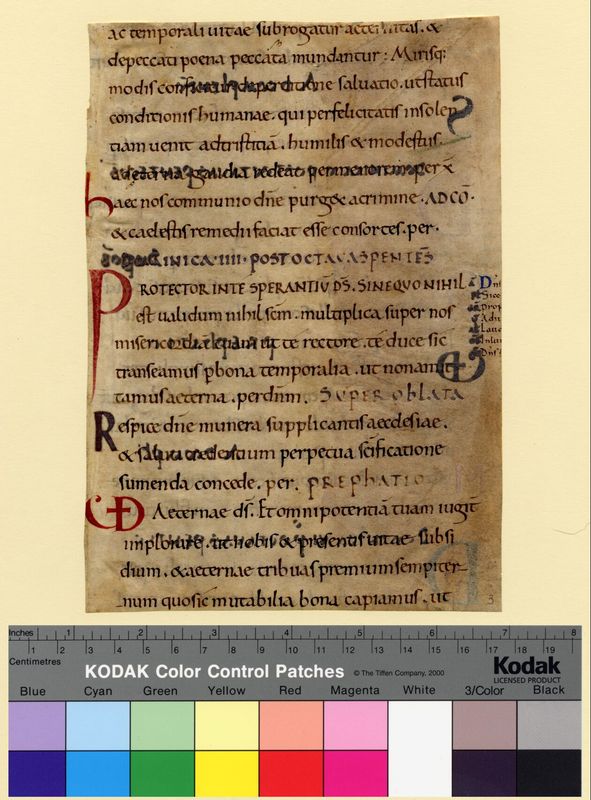
Identifier: Fragmenta Manuscripta 003
Date: 1000-1015
Contents: Sacramentary
Language: Latin
Location: England
Sacramentary
One of the earliest liturgical books, the clergy used the sacramentary at the altar for the celebration of the mass and the other rites of the Church, including exorcisms, blessings, and consecrations. This liturgical book was eventually replaced by the missal that combined the sacramentary, lectionary, and gradual into one book.
Lectionary
A lectionary is a form of liturgical book that contains the readings that the clergy used during the celebration of the mass. These readings could include short passages from the bible, commentaries on the bible, or from other works pertaining to religion. The lectionary was later combined with the sacramentary and gradual to form the missal.
Gradual
The gradual is the liturgical songbook. It contains the songs for the celebration of the mass and was used by the choir. Originally, this was a separate book, however, for convenience, it was combined with the lectionary and sacramentary to form the missal.
Missal
Around the beginning of the thirteenth century, the separate volumes of the sacramentary, lectionary, and gradual were combined into one volume known as the missal to create a better user experience. The missal was used by the priest for the celebration of the mass. It consists of prayers, readings, and songs.
Breviary
The breviary is a text that was first introduced at the end of the twelfth century. The name breviary means abridgement, and the breviary could be thought of as a compilation of the major liturgical books including the lectionary and the psalter. The user could now consult one book for devotional readings rather than sift through multiple texts.
Breviaries were used in what is known as the Divine Office, a routine used by ecclesiastics that involves the recitation of religious texts at specified hours of the day. The canonical hours that divided the day into eight prayer hours are Matins (before dawn), Lauds (dawn), Prime (early morning), Terce (third hour, 9am), Sext (sixth hour, noon), None (ninth hour, 3pm), Vespers (sunset), and Compline (end of the day).
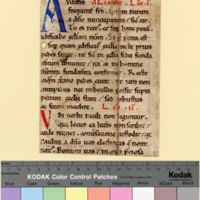
Fragmenta Manuscripta 007
Date: 1140-1160
Contents: Breviary with neumes
Language: Latin
Location: France
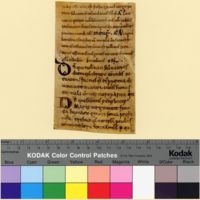
Fragmenta Manuscripta 039
Date: 900-999
Contents: Breviary
Language: Latin
Location: England, France?
Pontifical
The pontifical is the official book used by the Pope and bishops. Included in the pontifical are the texts for the rites of Confirmation, the coronation of kings and queens, blessings of abbots, abbesses, nuns, and for foundation of churches, and other rites performed by the bishop. The pontifical also includes the litany and a publication of the moveable feasts of the Epiphany.
Martyrology
A martyrology is a way to keep track of all the saints commemorated by a specific community. The text is organized into a calendar and includes the names of the saints and short accounts of their life and martyrdom that would be read on their feast days. The first martyrologies date to the fourth century.
These tree fragments come from the Martyrology of Usuard (d. c. 877).
Ordinal
The ordinal is a type of liturgical book that is not used in the celebration of the mass, the office, or the sacraments. Instead, it is a general guide to the liturgy of a specific church. The ordinal provides a calendar featuring an abbreviated list of chants, readings and prayers for every celebration the Church recognizes, most importantly these include every Sunday and every feast day. The name comes from the Latin word ordo, meaning order, which is exactly what the ordinal provided; the book provided an authoritative document on the officially recognized celebrations of a given community.
Processional
This liturgical book includes the litanies and hymns used in religious processions. Processions occurred on the important holidays and feast days of the Church and before the mass every Sunday. The first processionals date to the early tenth or eleventh century.
Homily
A homily is a commentary prepared by an ecclesiastical official for the celebration of the mass. Homilies take on passages from doctrine and explain the literal and spiritual meaning of the text, often by relating the passage to current events. The name homily comes from the Greek homilia meaning to have a discourse. Homilies were written as early as the second century and therefore are one of the earliest liturgical texts.
Gregory the Great worte Homeliae in Evangelia and the Moralia in Job (Morals on the Book of Job). Click here for more on these works.
Bibliography
- British Library. “Liturgical Manuscripts—Books for the Mass.” Accessed June 26, 2020. https://www.bl.uk/catalogues/illuminatedmanuscripts/TourLitMass.asp#:~:text=top,manuscript%20is%20often%20highly%20illuminated.
- Homs, J.M. Casas. “Una Grammatica inedita d’Usuard.” AMont 10 (1964): 87-124.
- Lebigue, Jean-Baptiste. "Liturgical Documents: French Ordinals." Paper presented at the International Congress on Medieval Studies, Kalamazoo, Michigan, May 2009. https://halshs.archives-ouvertes.fr/halshs-00390061/document.
- Lemaître, Jean-Loup. “Usuard.” In Encyclopedia of the Middle Ages, edited by André Auchez. Cambridge: James Clarke & Co, 2000.
- New Advent. “Liturgical Books.” Accessed June 26, 2020. https://www.newadvent.org/cathen/09296a.htm
- Palazzo, Eric. A History of Liturgical Books from the Beginning to the Thirteenth Century. Translated by Madeleine Beaumont. Collegeville, Minnesota: The Liturgical Press, 1998.
- Quentin, Henri. Les martyrologes historiques due Moyen Âge. Paris, 1908.
- “The Processional: Texts for Singing the Processional Songs of the Mass from the Church’s Primary Sources.” Society of St. Gregory with the approval of the Department of Christian Life and Worship of the Bishops’ Conference of England and Wales. 2012. http://www.liturgyoffice.org.uk/Missal/Music/ProcessionalBook.pdf.
- University of Bergen. “Book Types.” The Medieval Manuscript. Accessed June 8, 2020. https://fragment.uib.no/?k=4641.
